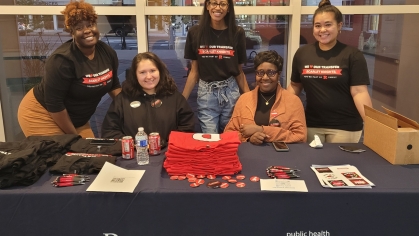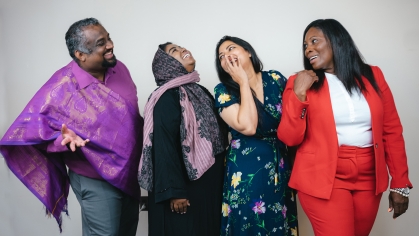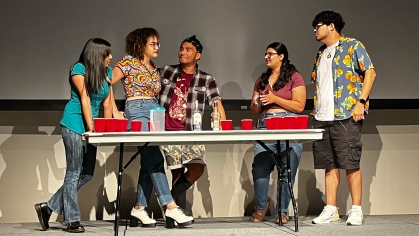Recreation’s Fitness Classes Provide Space for Students to Exercise and Create Community
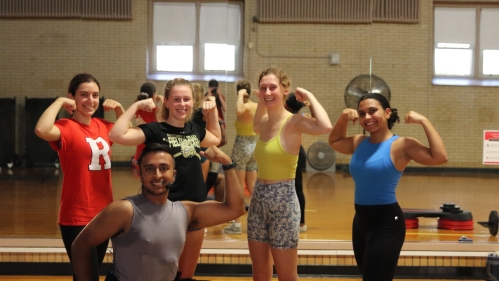
With everything that Rutgers students have going on—classes, part-time jobs, and extra-curricular activities—it can be difficult to find the time to take care of themselves.
To help meet that need, free group fitness classes are available to students at four out of the five Recreation Centers at Rutgers University—New Brunswick.
“We offer group exercise classes to bring people into a non-judgmental, welcoming space where they can cultivate a healthy lifestyle and take care of themselves,” said Braily Bernaber, the fitness coordinator for Recreation, one of the biggest departments in the Division of Student Affairs.
The classes themselves are designed to offer participants a range of different experiences. For example, while “Flow Yoga” connects the mind to the body, “RU Fit” provides a high-intensity workout, and “Bodypump” builds participant strength.
However, despite the natural differences between classes, instructors have the ability to adjust every class to match the skill level of their participants.
“I always give my participants a modification option and a challenge option,” said Sagar Singal, a senior majoring in business and a fitness instructor who teaches BodyPump and Body Combat classes.
“I’ve had plenty of people come into my class who think, ‘Oh, this is going to be so easy,’ and, after I challenge them, they leave the room saying, ‘This is awesome.’”

On top of making sure that participants are adequately challenged, instructors also work to create an encouraging environment for their participants.
“I hope my class shows that exercise can be fun rather than a chore,” said Gill Woody, a senior double majoring in economics and history, as well as a fitness instructor who was certified by Rutgers to teach Zumba classes.
“Group exercise helps people get over themselves—Zumba makes us look ridiculous because we’re all doing dance moves that we don’t know ahead of time—and you, as a student, are blindly following the instructor.”
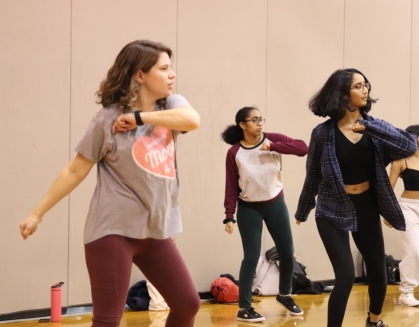
Additionally, contrary to popular conceptions of exercise, these classes are not designed simply to help participants lose weight, but to get them engaged in healthy habits and community.
“There is no one definition of health, just like there is no one definition of fitness,” said Singal. “In my classes, everyone has their own goals: some people might be sitting at a desk all day and just want to move around, while others might want to focus more on performance and lifting heavier weights.”
“I’m not trying to punish people with exercise, I’m trying to get our participants to understand it as something that we’re doing out of self-love.”
For Woody and Singal, who have been teaching fitness classes for years, their work has done more than given them a chance to build community with their participants—it has also taught them transferable skills, from public speaking to improvisation and flexibility.
“I’ve learned how not to feel shy in front of a group of people, and I’ve learned how to maintain a maximum amount of energy, no matter who’s in my class,” said Woody. “I’ve also learned how to be flexible and work within a team to cover classes, co-teach, and give tips on each other’s classes.”
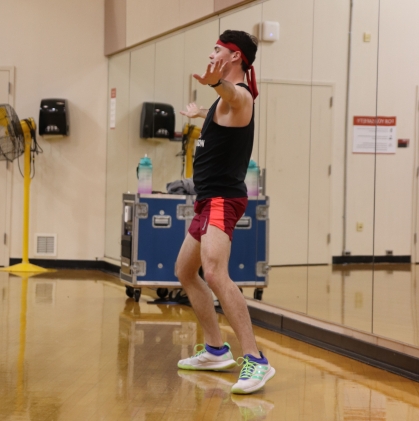
Still, to the instructors, and to Bernaber, these classes are more than the sum of their parts.
“Our fitness classes, as well as Recreation overall, value a healthy lifestyle in terms of our emotional, physical, and spiritual health,” Bernaber said.
“These classes allow students to control their stress, they show them how to take care of their body, and they give them an opportunity to socialize around people like them.”
Visit Recreation’s website to view a full list of its resources, including Aquatics, Club and Intramural Sports, and Adventure Recreation programs. Click here to learn more about Recreation’s fitness classes.
There is a Recreation Center on each campus; click here to see the hours for each.

